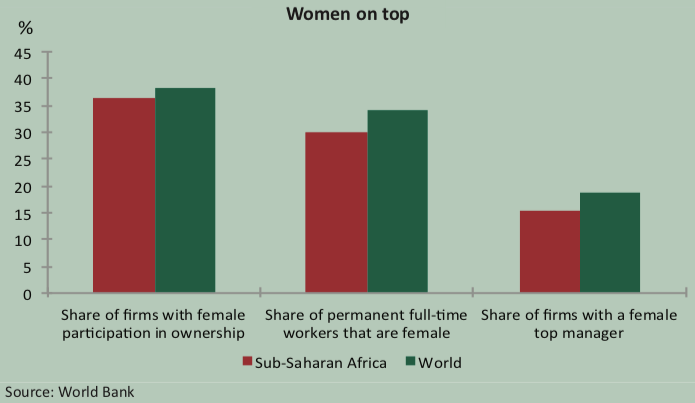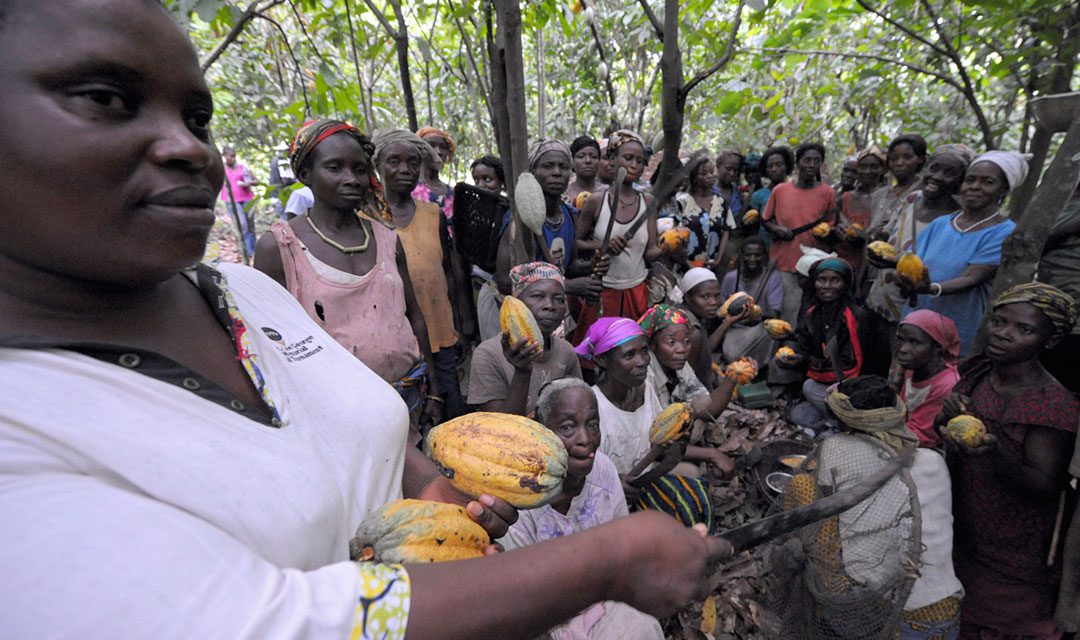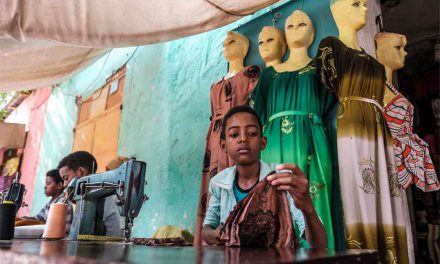Women’s entrepreneurship in Africa
Is numerical parity natural justice?
A prosperous future for Africa depends upon a greatly enhanced economic role for women. Women, half of the adult population, represent vastly underutilised human potential. As the bedrock of Africa’s families, they can also bring important social values and insights to the continent’s development.
Intrusive laws that impose a 50:50 gender ratio in the business environment are not conducive to expanding women’s participation. A social and legislative environment that supports all entrepreneurs, male and female, would be a more effective path.
South Africa’s government is driving the Women Empowerment and Gender Equality Bill, aimed at enforcing “gender equality” across all sectors. Under this draft law, currently winding its way through parliament, the minister for women, children and people with disabilities will select, according to her own discretion, companies that will have to fill half their decision-making positions with women. She will publish her designations in the Government Gazette.
Additionally, the law will require “gender mainstreaming”. In other words, all policies and programmes in the public and private sectors will need to be measured against the impact, intentional or not, on women.
But the proposed law’s prevailing presumption—numerical parity as natural justice—has little empirical basis. Groups, whether defined by gender, ethnicity, religion, race or any other demographic, seldom distribute themselves proportionally across any activity, no matter how ideal the environment, as American economist Thomas Sowell has exhaustively shown. There is no reason to expect this in South Africa.
The bill prescribes crippling penalties for non-compliance: firms may be fined up to 10% of turnover, which many would not survive. The additional regulatory burden will make business more difficult for all and discourage aspirant entrepreneurs, both men and women. By putting obstacles in the way of entrepreneurs, the act could end up inhibiting women’s economic involvement rather than stimulating it.
Nothing promises “empowerment” like entrepreneurship. It signifies selfeman- cipation. An entrepreneur consciously takes control of her destiny, relying on her own smarts for a livelihood. Successful women entrepreneurs can set examples that challenge social attitudes.
Women represent “a vast untapped source of innovation, job creation and economic growth in the developing world”, says Carmen Niethammer, a gender specialist with the International Finance Corporation, a division of the World Bank.
The entrepreneurial spirit is alive in Africa as nowhere else. Some 27% of sub- Saharan Africa’s workforce is operating an early-stage business (one less than three- and-a-half years old) and another 15% an established firm, the Global Entrepreneurship Monitor (GEM) estimates in its 2013 report. This is a higher rate than anywhere else by a considerable margin.
By comparison, 19% of Latin America’s workforce is operating a young business and 8% an older one. In Asia and the Pacific 12% are operating both types of businesses. Developed countries tend to have even lower rates, with 8% in the European Union operating a fledgling business and 6% a proven business.
Africans are also upbeat about entrepreneurship, holding positive views of the opportunities available and their abilities to make them succeed, according to the GEM report. Women entrepreneurs are advancing strongly in Africa: their presence among early-stage entrepreneurship is virtually on a par with men. Some of the continent’s most successful entrepreneurs are women, such as Ethiopia’s Bethlehem Tilahun Alemu, founder of sole Rebels footwear (see page 41), and Nigerian clothing manufacturer Ruff ‘n’ Tumble’s Adenike Ogunlesi.
These entrepreneurs are the exceptions, however. Women in Africa are more likely to be operating in the informal sector. Those in the formal sector tend to have firms that are smaller than men’s, according to research conducted for the International Labour Organisation (ILO) between 2002 and 2004.
What is preventing Africa’s women from joining the formal sector? Women’s entrepreneurship must be understood on two distinct levels, argues Professor Teresa Cruz e Silva, a social scientist at the Eduardo Mondlane University in Mozambique.
Africa’s “market women” are the continent’s first and dominant face. These small traders operate without business licences and are not registered with the tax authorities. They deal in the goods and services familiar to domestic life. They sell consumables, prepare food and make craftwork. They work to survive rather than to prosper.
At this level in particular, many barriers are gender-determined. Despite significant reform over the past three decades, legal equality between men and women remains incomplete in many countries. Customary law and family codes dating from times when male dominance was uncontroversial remain in force.
In places, attempts at reform over the past decade have failed in the teeth of societal objections. Even in countries that have taken economic reform and gender equality seriously (such as Tanzania and South Africa), these barriers linger. Legal guarantees for equality and women’s property rights co-exist with discriminatory customary law and social attitudes. Moreover, social expectations of women’s domestic responsibilities worldwide, no matter the legal environment, impose an additional burden, according to a 2004 ILO report. This leaves limited options for women to move beyond survivalist trade and other employment.
Education is one of the major determining factors for successful entrepreneurs. Yet across the continent, women’s adult literacy rate is only 75% that of men, according to a 2011 UNICEF study. Girls’ enrolment in primary education is near parity with boys’ at 96%, but falls at secondary level to 87%, according to the study. Progress has been made, but much remains undone.
The second face of Africa’s women entrepreneurs is the small cadre of women at the helm of prosperous enterprises in the formal sector. They tend to be educated and to have work experience, according to 2013 research by SBP, a South Africa-based research firm.
These successful women engage with the modern world. They buy from and sell to other enterprises, and understand the possibilities of innovation and of exploring new markets. They have also moved beyond the sectors in which women have conventionally operated, such as personal services and retailing.
Although men and women entrepreneurs are more similar than different in their approach to business, women are more concerned with balancing their careers with family interests, according to Cindy Norcott, a South African businesswoman and philanthropist. This is the case even in societies with long traditions of gender equality. The outcome is frequently a greater aversion to risk and a restrained approach to growing firms’ markets, turnover and employee complement.
What can be done to encourage more women into entrepreneurship and to support those already there?
Legislation is a first step. Rwanda’s prudent reform has eased business bur- dens and helped to spur growth. It outlawed discrimination against women in property rights and streamlined the regulatory burdens over the past two decades, according to the World Bank.

But gender-biased policy options can be counter-productive. In Nordic countries, for example, women make up a lacklustre proportion of their entrepreneurial communities, despite gender-sensitive policy environments and a social consensus, according to the GEM study. Generous provisions for maternity leave and childcare are linked to salaried employment. Inadvertently, this policy environment has drawn women away from an entrepreneurial career.
Most importantly, African women need to be recognised in all spheres as full citizens. Remaining legal inequalities relating to inheritance, property and labour rights must be reformed. Policymakers need to prioritise girls’ education urgently.
Doing business in Africa is generally not for the faint-hearted. Libraries have been written about the continent’s developmental challenges: poor infrastructure, weak governance, onerous regulations and haphazard laws. Perhaps a more pertinent question is: what needs to be done to improve the prospects for all entrepreneurs, whether male or female?
Smaller firms, disproportionately owned by women, are especially vulnerable to red-tape burdens and governance deficiencies. Prudent policy reform aimed at smoothing the environment for business, although not specifically gender-focused, will nevertheless give women greater opportunities to be successful in business.
Terence Corrigan is an independent researcher, political consultant, writer, editor and illustrator. He is currently a research fellow at the South African Institute of International Affairs (SAIIA) in its Governance and African Peer Review Mechanism Programme and a policy fellow at the Institute of Race Relations (IRR).












